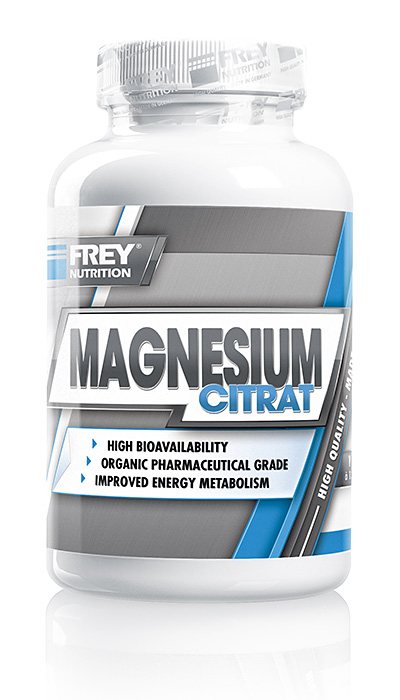WHY MAGNESIUM IS SO IMPORTANT FOR ATHLETES!
This particularly affects the risk group for magnesium deficiency (pregnant women, athletes). A magnesium deficiency manifests itself in nervousness, poor concentration and the famous muscle cramps, among other things.
MAGNESIUM: A CLASSIC ALL-ROUNDER
Magnesium has countless functions in the body. Among other things, it is needed for aerobic and anaerobic energy production, the production of proteins, muscle contraction and relaxation, and much more. Numerous studies from the last ten years have shown how important magnesium is for athletes. All of them come to the unanimous conclusion that even a slight magnesium deficiency noticeably impairs athletic performance.STUDY 1: LITTLE MAGNESIUM, LITTLE POWER
As part of a US study from 2003, the test subjects (all women) had to complete several tests on an ergometer while gradually reducing their magnesium intake. The result: analogous to the magnesium deficiency, oxygen consumption and heart rate increased at the same wattage.STUDY 2: IMPROVED ENDURANCE PERFORMANCE WITH GOOD SUPPLY
A US study from 1999 can be used as a counter test. In this study, physically active students were given 8 mg of magnesium per kilogram of body weight every day. In subsequent endurance tests, it was shown that the subjects were able to significantly increase their aerobic performance and reduce their oxygen consumption during submaximal training.STUDY 3: MAGNESIUM REDUCES LACTATE ACCUMULATION
A Turkish study from 2006 examined the effects of a daily dietary supplement of 10 mg of magnesium per kilogram of body weight on 30 sprinters. During the four-week study, the subjects were divided into three groups:2. FOOD SUPPLEMENTS AT 5 UNITS PER WEEK OF 1.5 HOURS
3. NO FOOD SUPPLEMENTS FOR 5 UNITS PER WEEK OF 1.5 HOURS
The result: In the training group with increased magnesium intake, the lactate level fell more quickly after exercise during the same training than in the control group without nutritional supplements.
There are many other studies on magnesium that attribute anti-inflammatory and stress-reducing effects to the mineral, among other things. However, since most of them were carried out on animals, the question arises as to the extent to which they are also valid for humans.
WELL SUPPLIED: HERE IS A LOT OF MAGNESIUM
Roasted pumpkin seeds are the number one source of magnesium, with around 500 mg of magnesium per 100 g. Almonds and many types of nuts are also rich in the mineral. But be careful: the top sources of magnesium are high in fat and should therefore not be consumed in large quantities.Lower-fat alternatives include natural whole grain products and green leafy vegetables. However, most of the magnesium is lost when the vegetables are cooked. And of course, we must not forget mineral water, although the magnesium concentration varies greatly from brand to brand. A look at the mineral table can help - it's worth comparing! There are very expensive mineral water brands (e.g. Vitel or Volvic etc.) which, however, only contain a fraction of the magnesium concentration of much cheaper mineral water. When choosing the right mineral water, expensive does not necessarily mean good, which is why it is always worth comparing the mineral content.
IT'S ALL ABOUT THE CONNECTION!
If you take the trouble to go to the pharmacy or health food store in search of a magnesium supplement, you will be literally overwhelmed. You will be offered and praised a huge number of different magnesium products. But which is the best? Which is the highest quality? It is not an easy question and many people mistakenly rely solely on the amount of magnesium contained in the product, according to the motto "the more the better"! But unfortunately it is not that simple...Studies conducted in the past have shown that the total amount of magnesium in a product is less important than its compound. This is because this determines how well our body can absorb the magnesium we ingest. There are a number of well-known Mg compounds that are divided into inorganic (such as oxide) and organic (such as citrate, i.e. bound to amino acids). Studies show that organic compounds have a significantly higher bioavailability than inorganic ones, which is more than understandable because organic substances are more similar to our body than inorganic ones.
For this reason, you should avoid preparations such as magnesium oxide and/or carbonate and focus on high-quality products, i.e. MAGNESIUM CITRATE The latter in particular are optimally absorbed, meaning that less is needed to achieve the desired positive effects for the muscles and the organism.
OVERDOSE: THE TOILET SAYS HELLO
Healthy people simply excrete excess magnesium - the body can absorb around 30 to 50 percent of the magnesium it consumes. However, taking magnesium-containing medicines or over-the-counter dietary supplements in too high a dose can lead to diarrhea, nausea, vomiting, and other side effects.You should also be careful when taking magnesium supplements at the same time as other substances such as antibiotics or iron. If the supplements are not taken a few hours apart, they can cancel each other out. Alcoholism or diabetes mellitus also limit the ability to absorb magnesium. On the other hand, the combination with calcium, such as in mineral water, has a positive effect on magnesium absorption. For the greatest possible absorption, magnesium should ideally be taken evenly distributed throughout the day with meals be taken.
An average dosage for athletes is approx. 400 to 800 mg Magnesium daily. The higher and more frequent the physical exertion, the more magnesium is required by the muscles. Athletes with significantly more muscle mass also have a significantly higher magnesium requirement, which can often rise to 2000 to 3000 mg per day. Since muscles in particular rely on magnesium for their contraction function, the requirement increases with increasing muscle mass.













